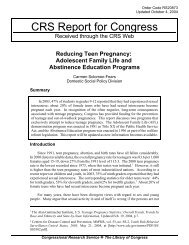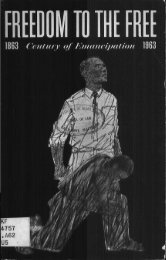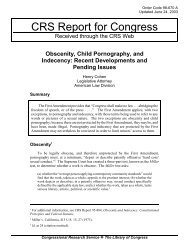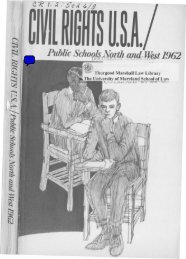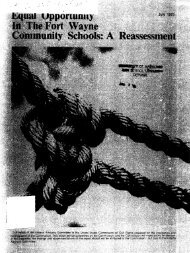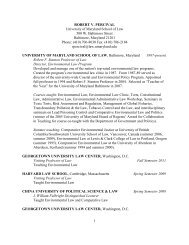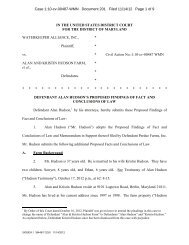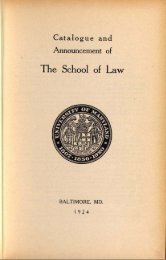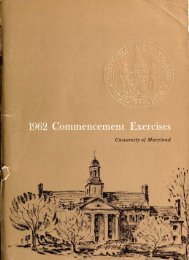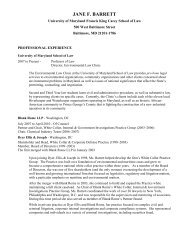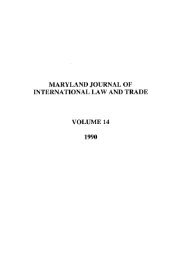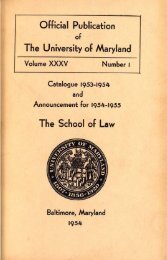University of Maryland School of Law : Catalog, 1988-1989
University of Maryland School of Law : Catalog, 1988-1989
University of Maryland School of Law : Catalog, 1988-1989
Create successful ePaper yourself
Turn your PDF publications into a flip-book with our unique Google optimized e-Paper software.
Labor <strong>Law</strong> (3)<br />
Students study the law governing<br />
labor-management relations, including<br />
union organization and<br />
representation <strong>of</strong> employees, regulation<br />
<strong>of</strong> economic weapons, and<br />
negotiation and enforcement <strong>of</strong><br />
collective bargaining agreements,<br />
all with emphasis on the controlling<br />
federal statutes.<br />
Day (<strong>Law</strong> 534 Q—Ms. Weiss; Evening<br />
(LAW 534 H)— Mr. Rubenstein.<br />
Labor <strong>Law</strong> Seminar* (3)<br />
This seminar includes advanced<br />
work in such topics as statutory<br />
and common law individual employment<br />
rights, workers' democratic<br />
rights within unions, labor<br />
relations in the public sector, and<br />
individual versus collective rights<br />
and interests in the workplace.<br />
P: Either Employment <strong>Law</strong> or Labor<br />
<strong>Law</strong> R: Employment Discrimination<br />
<strong>Law</strong>.<br />
Day (LAW 565 Q— Not <strong>of</strong>fered<br />
<strong>1988</strong>-89.<br />
Land Use Control (2)<br />
This course studies public controls<br />
on the use <strong>of</strong> land including zoning,<br />
subdivision regulations, <strong>of</strong>ficial<br />
plans, water and sewer permits, impact<br />
fees and environmental laws.<br />
Attention is paid to the judicial review<br />
<strong>of</strong> the constitutional, political<br />
and economic issues which these<br />
controls present.<br />
Evening (LAW 535 H)— Mr. J.<br />
Smith.<br />
82<br />
<strong>Law</strong> and Biomedical Sciences<br />
Seminar* (3)<br />
This seminar examines the legal<br />
and ethical issues raised in various<br />
health care settings and by the<br />
rapid expansion <strong>of</strong> medical technology.<br />
The issues explored may<br />
include informed consent; medical<br />
experimentation; foregoing life-sustaining<br />
treatment; abortion; the<br />
new reproductive technologies; surrogate<br />
parenting; genetic screening;<br />
genetic engineering; and organ<br />
transplantation.<br />
Day (LAW 596 C)—Ms. Rothenberg.<br />
<strong>Law</strong> and Economics Seminar*<br />
(3) and/or Course (2)<br />
This course will introduce the student<br />
to the application <strong>of</strong> welfare<br />
economics to the analysis <strong>of</strong> problems<br />
in law and jurisprudence.<br />
Topics will include some <strong>of</strong> the following:<br />
The Case Theorem and<br />
the efficiency analysis <strong>of</strong> common<br />
law rules; the ethical critique <strong>of</strong> efficiency;<br />
elementary social choice<br />
theory leading to the pro<strong>of</strong> <strong>of</strong> Arrow's<br />
Theorem; Prisoner's Dilemma<br />
and free-rider problems; Newcomb's<br />
problem and the concept <strong>of</strong><br />
rational choice; Nash's solution to<br />
the bargaining problem; Kahneman<br />
and Tversky's critique <strong>of</strong> utility<br />
theory.<br />
The course won't presuppose<br />
any background in mathematics<br />
beyond high school algebra and geometry,<br />
but students must be willing<br />
to work with symbols.<br />
Day (LAW 548 D)—Not <strong>of</strong>fered<br />
<strong>1988</strong>-89.<br />
<strong>Law</strong> and Education Seminar*<br />
(3)<br />
This seminar will analyze constitutional,<br />
statutory, regulatory and<br />
common law influences on the<br />
governance, financing and management<br />
<strong>of</strong> educational enterprises,<br />
with emphasis on "public" schools,<br />
higher education institutions, related<br />
regulatory agencies and coordinating<br />
commissions.<br />
P: Constitutional <strong>Law</strong>.<br />
Evening (LAW 580 H)—Ms. Heller<br />
and Mr. Mingle.<br />
<strong>Law</strong> and the Homeless<br />
Seminar* (3)<br />
This seminar will explore the<br />
causes <strong>of</strong>, and legal responses to,<br />
homelessness in the United States.<br />
The purpose <strong>of</strong> the seminar is to<br />
examine the roles <strong>of</strong> lawyers,<br />
courts, legislatures, and executive<br />
branch agencies in alleviating or<br />
aggravating the problems <strong>of</strong> the<br />
homeless. Topics for discussion will<br />
include public policies on shelter<br />
and housing, rights to shelter and<br />
to alternative housing, zoning restrictions,<br />
income maintenance,<br />
creation <strong>of</strong> advocacy systems, deinstitutionalization<br />
and rights to aftercare,<br />
compulsory treatment and<br />
shelter, legal problems <strong>of</strong> homeless<br />
children, rights to vote, and directions<br />
for legislative and other legal<br />
reforms. Each student will prepare<br />
a paper on a topic selected in consultation<br />
with the instructors. In<br />
addition, students will visit one or<br />
more shelters and conduct intake<br />
interviews with homeless persons<br />
seeking legal assistance.<br />
Day (LAW 536 Q—Mr. Herr and<br />
Ms. Hollandsworth.



